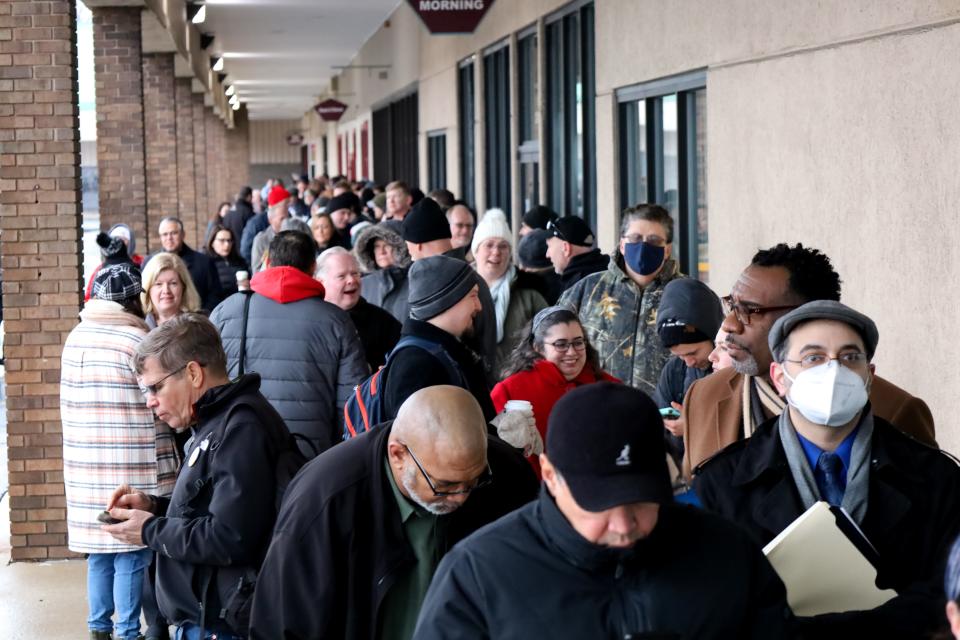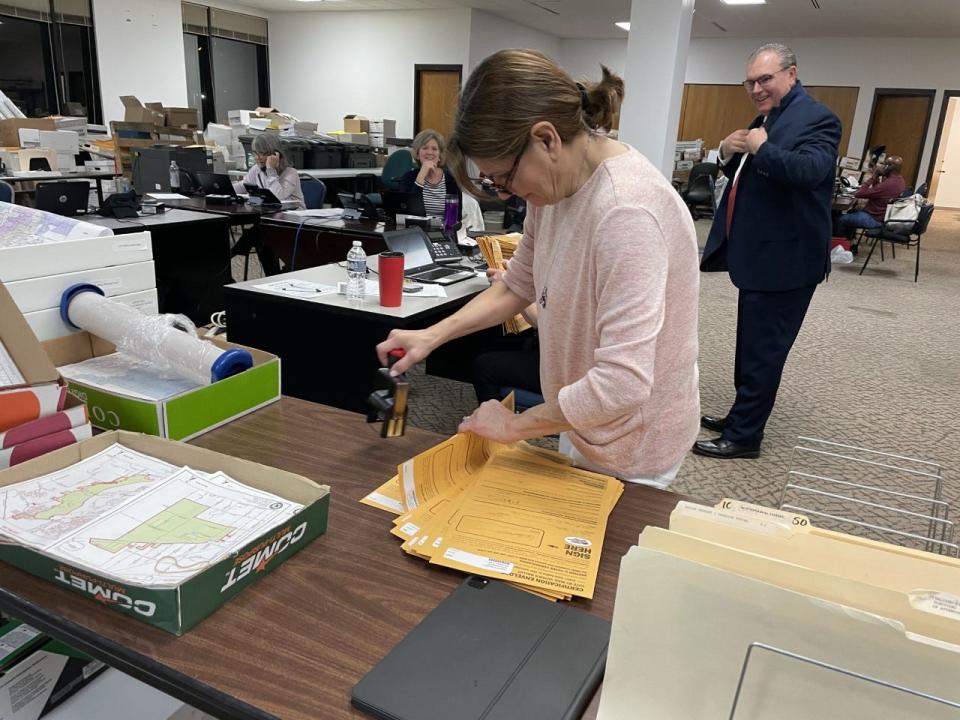Ready, set, line up: Monday is the start of candidate filings for the March primary
- Oops!Something went wrong.Please try again later.
With the Illinois 2024 primary less than four months away, established party candidates can start filing nomination papers Monday with county and state election authorities.
Illinois voters will head to the polls on March 19 with presidential, congressional, state legislature and other local races on the ballot. Most candidates began circulating nominating papers in September, while presidential candidates started this process last month.

A lengthy line of candidates is expected outside the Illinois State Board of Elections office on MacArthur Boulevard starting at 8 a.m. Matt Dietrich, ISBE spokesperson, explained candidates line up early in hopes of securing a higher position on the ballot than their competition.
More: Shafer, Robinson-McNeese honored posthumously by interfaith association
Candidates who are in line by that time are guaranteed top-of-the-ballot status or are placed in a lottery for the top slot if simultaneous filings occur. However, the impact ballot position has on voters is a murky science at best.
"Sure, it could be superstition," Dietrich said. "Ballot candidates, you know, they believe that any slight advantage they want to take advantage of."
For local races such as state's attorney and county recorder, candidates will file with the Sangamon County Clerk's office. A similar scene is expected outside the office, located at the former home of The State Journal-Register at 915 E. Capitol Ave.
All candidates are required to file a statement of candidacy, nominating petitions, and a statement of economic interest. Sangamon County Clerk Don Gray said his staff is ready.
"We always refresh to ensure that we know all the elements required a filing from a staff perspective," he said. "And we've already performed that and we're prepared and ready to accept any filings of those that are qualified to seek office."
The filing deadline is 5 p.m. on Dec. 4. Democratic and Republican presidential candidates will file nomination papers with ISBE starting in January. Independents and candidates belonging to new political parties begin the process in June 2024.
Who's running?
ISBE will update its candidates' list in real-time on its website once the filing period opens. Several candidates already have gone public with their campaigns.
The primary elections will feature 23 state Senate and all 118 House seats up for grabs. Locally, state Rep. Mike Coffey, R-Springfield, will be in his first election and will be in a contested Republican primary against Kelvin Coburn, a public service administrator with the Illinois Department of Transportation. Rep. Sue Scherer, D-Decatur, will also be seeking a seventh term in House District 96.
Neither U.S. Sens. Dick Durbin nor Tammy Duckworth are up for re-election next year, making the presidential election the sole race on all ballots in Illinois. Voters decide who will represent them in the state's 17 congressional districts.
Republicans, so far, will choose between two primary challengers to represent the 13th Congressional District. Thomas Clatterbuck, a University of Illinois Urbana-Champaign College of Law student and former part-time staffer in the Sangamon County Circuit Clerk’s office will match up against Virden military veteran Joshua Loyd.
On the Democrat side, incumbent U.S. Rep. Nikki Budzinski, D-Springfield, is expected to seek re-election.
More: Lacking establishment support, Bailey says grassroots congressional campaign will win
Several countywide races such as auditor, circuit clerk, coroner, recorder, and state's attorney also will be on Sangamon County ballots in addition to 14 county board seats and precinct committeemen.
Newly sworn-in Sangamon County State's Attorney John Milhiser has announced his intention to seek a full-term, presently serving the remainder of now Seventh Judicial Circuit Associate Judge Dan Wright's term. Springfield attorney Kent Gray also has said he plans to run for state's attorney as a Republican.
Illinois Supreme Court Justice Lisa Holder White will also be running for a full-term in the Fourth District of the state's high court. Filling the vacancy created by Justice Rita B. Garman's retirement, Holder White became the first Black woman to serve in July 2022 following a unanimous appointment vote by the court.
To appear on the ballot, candidate petitions must receive signatures from 0.5 percent of the qualified electors in their congressional district and 0.4 percent in judicial districts.
This means districts that favor one party — Democrats in the case of the 13th — force Budzinski to collect more signatures than Clatterbuck and Loyd. Holder White's district is more conservative, so she will need more signatures than any Democratic challengers.
Democratic and Republican candidates in General Assembly races need 1,000 signatures in the Senate and 500 in the House. Presidential candidates of those parties need 3,000 signatures.
Voter security
Voter security is of paramount concern to state lawmakers and election officials ahead of the 2024 elections.

Discussion on vote-by-mail and protections from foreign interference in elections were the focus of a subject matter hearing last month in Chicago.
Brian Pryor, ISBE election operations director, explained that the election system is run from the bottom up where county officials are responsible for procuring voter systems and finding election judges. Still, the board oversees state voting guidelines and tests those systems.
More: Illinois lawmakers consider two bills establishing rank choice voting. How does it work?
State officials consider the cyber navigator program crucial to protecting elections against cyber attacks. In 2016, Russian agents hacked the information of 76,000 Illinois voters. The navigator program was created as a result and places navigators in four geographic zones to train local officials on how to spot cyber attacks. Pryor said the program gives counties, big and small, a uniform level of protection.
"It's a never-ending concern," said Dietrich at the meeting. "You have to be aware all the time that there are international actors, domestic actors who are trying to break into our systems.
"Not so much to influence elections, but to wreak havoc."
Ahead of the elections, ISBE will use public service announcements to fight vote-by-mail misinformation. The board also plans on using a broad social media campaign to tackle the growing use of artificial intelligence in political advertising.
Early voting starts on Feb. 8.
Contact Patrick M. Keck: 312-549-9340, pkeck@gannett.com, twitter.com/@pkeckreporter.
This article originally appeared on State Journal-Register: Illinois candidates can start filing for the March primary on Monday

